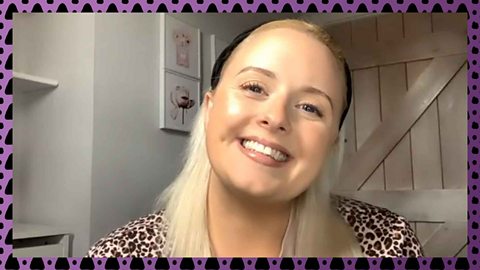This article was first published on May 28 2021
If you've been feeling bored, you're not alone. Pandemic-related restrictions have made it hard for us to get out and do many of the things we enjoy doing and it's not surprising that this can make us feel flat and unmotivated. Research has shown that boredom has been a major challenge for young people during the last year. Here, four young people give us the lowdown on how they manage their feelings of boredom.
Female 1: When I feel flat and unmotivatedтІ
Female 2: Itтs just, like, grey. Urgh, thatтs just it, I canтt even describe why it feels that way. Thatтs just how it feels. Itтs just тurghт.
Female 1: The little things, sometimes, is whatтs the most important and your kickstart to sort of, like, start your day and start your flow. Sometimes, just going downstairs to get yourself, like, a cup of tea can just make you feel better for the whole day. The motivation is a struggle to get out there half of the time, and I literally can get to the end of the day and the sun is about to go down and I still havenтt done anything.
Female 2: But I just need to remind myself how good it feels to actually do something with your day. Something I like to do to just, kind of, like cut off that bad mood is, I really like to exercise outside, like even if itтs just a jog or something, because it really does like get those endorphins going.
Male 1: For my nannaтs birthday, I made a dance for her. My grandma loved it. I feel powerful and electrifying. I do ballet, breakdancing, I do street dancing and I do breakdance because sometimes Iтve got very sick moves, cool moves.
Male 2: Iтve learnt that learning a new skill, like juggling, has helped me a lot. Especially since Iтm still learningтІ ooh! But Iтm getting a little bit better at it every single day. Like, every single month, I try and push myself to achieve something new. Even if itтs small things like helping my mum cook around the house. Iтm not the best cook, soтІ
Female 1: One of the things Iтve been really focusing on is stretching, but Iтm really trying to get in the splits. Iтm just, like, criminally unflexible, like, itтs so embarrassing. It sounds a bit deep, but I like to, kind of, remember why I care about the things that Iтm supposed to be doing. Like, why did I start doing this thing in the first place?
Male 1: I love cooking. I make, like, pizza, I make, like, pasta and make some chilli for my dad. I think my dad will be happy because I feel happy too.
Female 2: My pieces are very valuable to me, and I like sharing them with people. Like, when I give a piece to someone, it feels like Iтm giving them like a piece of my heart and they really appreciate it.
Male 1: I tell my family jokes. Knock, knock.
Presenter: Whoтs there?
Male 1: Doctor.
Presenter: Doctor who?
Male 1: Doctor Who!
Male 2: I feel like itтs super important to just take it easy on yourself. Erm, just because the way you feel is valid. Self love.
Presenter: Who in your family likes to hear your jokes the most?
Male 1: Me!
Top tips for dealing with boredom and low motivation
1. Be kind to yourself
Remember, lots of people have been bored, flat and unmotivated during the pandemic. You're not alone. Be kind to yourself and notice what you're feeling without judging yourself. It's been a tough year and it's understandable to feel this way.
2. Notice and record time spent on daily activities to see what helps
Noticing your feelings when you're doing different activities is so important. You can make a record of the things that you find rewarding or fun and try to schedule more time into your day to do those things.
3. Work out what matters or is important to you
Spend some time thinking about what really matters to you т what your values are т and which activities are in line with that. If you can find the intrinsic value in activities, you are more likely to do them. This video might help you find your driving force!
4. Do more of what matters
Plan activities that are in line with your values, like doing something nice for someone else or something that helps you move in the direction of your goals. Quite simply: work out what is important to you and then try to do more of it!
5. When you're feeling unmotivated, start doing something anyway
Start with a small step, even if you don't feel like it. Feelings of motivation usually appear after you've started to do something. Although there are limits and restrictions at the moment, think of what you can do, however small. And be sure to take note of your progress and what you've achieved, rather than the end goal. Getting started with a small step is a big achievement when you feel unmotivated.
6. Notice and pay attention to how it feels to do what you are doing
It is important to try and тget out of your own headт when doing an activity: instead pay attention to everything that is going on around you (e.g. sounds, smells, tastes). Reflect on how it felt: did it feel good? Do you want to do it again?
7. Imagine positive future images in detail and imagine the steps needed to get there
Mental images can have a really powerful effect on your mood. What do you look forward to doing? Imagine it with as much detail as possible, work out the steps you need to take to get there and if there are any obstacles, think of how you can remove them.
8. Try to notice and address any negative тself-talkт that's getting in the way of enjoyment or motivation
Negative thoughts like 'I'm no good at this,' or 'What's the point?' can get in the way of your enjoyment. Notice these thoughts and gently challenge them. Think again about your values and why you want to do this activity. Try to replace thoughts like 'I shouldтІ', 'I have toтІ' with 'I want toтІ' and focus on the why.
9. Make a commitment to others
If you plan to do something, it can be helpful to tell others about your plan as a way of committing to it. You can also plan to do things with others, where possible and doing things for others can have a positive impact on your wellbeing.
10. Seek help when it's needed
If feelings of boredom and low motivation are causing distress or interfering with daily life, it's important to speak to someone about them. There are some links to support below.

If you need support
You should always tell someone about the things youтre worried about. You can tell a friend, parent, guardian, teacher, or another trusted adult. If you're struggling with your mental health, going to your GP can be a good place to start to find help. Your GP can let you know what support is available to you, suggest different types of treatment and offer regular check-ups to see how youтre doing.
If youтre in need of in-the-moment support you can contact , where you can speak to a counsellor. Their lines are open 24 hours a day, 7 days a week.
There are more links to helpful organisations on ТщЖЙдМХФ Action Line.

The advice in this video and article is based on the findings of the Emerging Minds Co-Ray Project, led at the University of Oxford. You can find out more about the project and get further advice
Mental health and wellbeing
Stories, tips and advice on how to boost your mental health and wellbeing.

How to support a friend with their mental health
Katie Thistleton with advice from Young Minds on how to support a friend with their mental health.

Nick Grimshaw: How music can help your wellbeing
Nick Grimshaw interviews Professor Catherine Loveday to find out how music can help our wellbeing.
